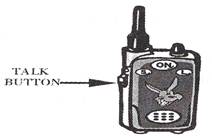
How can school ban mobile phones completely __________ some of the parents simply don’t follow the rule?
A. unless????????????? ????????????? ????????????? B. when????????????? ????????????? ????????????? ????????????? C. until????????????? ????????????? ????????????? ????????????? D. before
 天天向上一本好卷系列答案
天天向上一本好卷系列答案 小学生10分钟应用题系列答案
小学生10分钟应用题系列答案科目:高中英语 来源:2010年陕西省西安市铁一中学高一上学期期中考试英语卷 题型:完型填空
About once a month I have to go to Bedford for my work. One day I went into a 21 there to have something to 22 . The waiter took my coat and put it in a small room.
About an hour later I was 23 to go. The waiter 24 me my coat. Something fell out of the pocket onto the floor. It was a small white box. I took a 25 look at the 26 . “Oh, you’ve brought 27 coat,” I said to the waiter. “It looks very much like mine, 28 it is quite new, and this isn’t my box, either.”
“Oh, then I 29 someone has taken your coat and left his,” said the waiter. “This kind of thing 30 sometimes.”
I opened the box. There was a beautiful gold 31 in it. The waiter and I 32 to go to the police station.
“Has anyone lost a ring?” I asked at the station.
“Yes,” said a policeman. “A young man who came in this morning lost a ring, he lost it in London.”
He 33 the young man. A few minutes later, the man arrived.
“Yes, this is my ring,” he said. “How can I 34 you, sir? You see, I paid a lot of money for this ring and 35 I lost it on the train!”
After I told him the 36 of the coat, he said, “You haven’t been on the train. I haven’t been in the hotel, so how did my ring 37 in the coat?”
“Did anyone sit or stand next to you on the train?” asked the policeman.
“Yes,” said the young man. “But I don’t remember his face.”
“You may remember this 38 ,” said the policeman. “Was it like this one?”
“Yes, it was,” said the young man. “But my friend here isn’t the thief.”
The policeman laughed. “No,” he said. “The thief on the train stole your ring, and 39 our friend here, he went into the hotel to get some food. Only he didn’t take the 40 coat away with him.”
| 【小题1】 |
|
| 【小题2】 |
|
| 【小题3】 |
|
| 【小题4】 |
|
| 【小题5】 |
|
| 【小题6】 |
|
| 【小题7】 |
|
| 【小题8】 |
|
| 【小题9】 |
|
| 【小题10】 |
|
| 【小题11】 |
|
| 【小题12】 |
|
| 【小题13】 |
|
| 【小题14】 |
|
| 【小题15】 |
|
| 【小题16】 |
|
| 【小题17】 |
|
| 【小题18】 |
|
| 【小题19】 |
|
| 【小题20】 |
|
查看答案和解析>>
科目:高中英语 来源:2012-2013学年浙江省台州市书生中学高一下学期期中考试英语试卷(带解析) 题型:阅读理解

You and your friends will have lots of fun with Rabbit
Ears Walkie -Talkies. You can talk to someone who is in another
room at your house or someone who is up to 180
feet away from you. You can take your walkie
-talkie with you when you go camping or walking.
Rabbit Ears Walkie -Talkies are easy to use. This is what you do:
1. Push the ON button.
2. Hold the TALK button in and say something. If your friend has his/her walkie - talkie on, he/she will hear you.
If you want to talk for a long time, you can lock the TALK button. Just push the button in and up. When you finish talking, push the TALK button down.
3. When you finish talking, let go of the TALK button and listen. When your friend pushes the TALK button and says something, you will hear what your friend says through your walkie -talkie.
4. When you finish talking with your friend, push the ON button again to turn your walkie-talkie off.
| REMEMBER ◆If you cannot hear , push L (loud) to make it louder. ◆If it is too loud, push S (soft) to make it quieter. |
| A.Locating places. | B.Listening to music. |
| C.Giving directions. | D.Talking with others. |
| A.Keep the button on. | B.Hold the button back. |
| C.Push the button in and up. | D.Turn the button off and down. |
| A.L | B.S | C.TALK | D.ON |
| A.show how to use Rabbit Ears Walkie -Talkies |
| B.explain to the readers his camping experience |
| C.introduce some special ways to make friends. |
| D.tell how to make Rabbit Ears Walkie –Talkies |
查看答案和解析>>
科目:高中英语 来源: 题型:完形填空
查看答案和解析>>
科目:高中英语 来源: 题型:阅读理解

You and your friends will have lots of fun with Rabbit Ears Walkie -Talkies. You can talk to someone who is in another room at your house or someone who is up to 180 feet away from you. You can take your walkie -talkie with you when you go camping or walking.Rabbit Ears Walkie -Talkies are easy to use. This is what you do:
1. Push the ON button.
2. Hold the TALK button in and say something. If your friend has his/her walkie - talkie on, he/she will hear you.
If you want to talk for a long time, you can lock the TALK button. Just push the button in and up. When you finish talking, push the TALK button down.
3. When you finish talking, let go of the TALK button and listen. When your friend pushes the TALK button and says something, you will hear what your friend says through your walkie -talkie.
4. When you finish talking with your friend, push the ON button again to turn your walkie-talkie off.
| REMEMBER ◆If you cannot hear , push L (loud) to make it louder. ◆If it is too loud, push S (soft) to make it quieter. |
查看答案和解析>>
科目:高中英语 来源: 题型:完形填空
查看答案和解析>>
湖北省互联网违法和不良信息举报平台 | 网上有害信息举报专区 | 电信诈骗举报专区 | 涉历史虚无主义有害信息举报专区 | 涉企侵权举报专区
违法和不良信息举报电话:027-86699610 举报邮箱:58377363@163.com